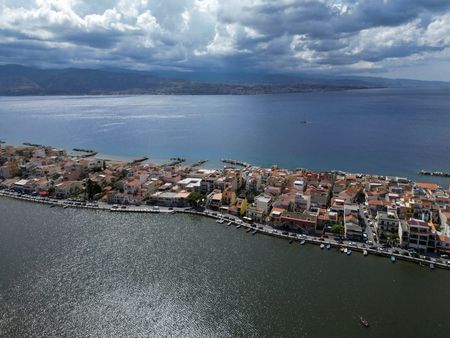By Angelo Amante
ROME (Reuters) -Italy’s Court of Auditors on Wednesday refused to authorise a landmark government plan to build a bridge connecting Sicily to the mainland, casting serious doubt on the viability of the 13.5 billion euro ($15.7 billion) project.
Prime Minister Giorgia Meloni denounced the ruling as an “intolerable interference” in the work of her administration, suggesting the court had acted out of political spite.
The court announced its verdict in a brief statement after a hearing earlier in the day, adding that it would publish its reasoning within 30 days.
While the rejection need not definitively halt the project, it casts a long shadow over its future. Meloni could seek a cabinet vote to override the court’s objections but such a move could leave the venture open to significant legal action.
Deputy Prime Minister Matteo Salvini vowed to forge ahead with the ambitious initiative, but gave no details.
GOVERNMENT SAYS PROJECT VITAL TO HELP UNDERDEVELOPED SOUTH
Long-standing plans to build the 3.7-km (2.3-mile) suspension bridge between Messina and Calabria were dropped in 2012 due to its high costs — which have since risen further.
However, Salvini, head of the far-right League party, has championed the project saying it is crucial for Italy’s underdeveloped south, and construction work had been scheduled to start later this year.
The contract for the Strait of Messina bridge project had been awarded to the Eurolink consortium following an international tender some 20 years ago. Led by Italy’s Webuild, it includes Spanish group Sacyr and Japan’s IHI.
A court councillor raised numerous doubts about the project during Wednesday’s hearing, questioning whether it complied with EU competition rules and noting that the original tender in 2005 had put the cost at just 3.8 billion euros.
“Our assessment is particularly rigorous because this… is public money. We need to ensure the project starts with adequate financing and will not later require interruptions that would be very damaging,” councillor Carmela Mirabella said.
RULING COMES AS MELONI SEEKS MAJOR JUDICIAL SHAKE-UP
The court ruling comes at a time of heightened tension between the government and the judiciary, with parliament due to approve on Thursday a sweeping reform that would fundamentally restructure Italy’s creaking justice system.
Italy’s powerful magistrates’ lobby has fiercely opposed the shake-up, which must go before a national referendum next year for final approval, saying it impinges on the judiciary’s prized independence.
Meloni said in her statement that approval of the reform would “represent the most appropriate response to this intolerable interference, which will not halt the government’s action, backed by parliament”.
The bridge has sharply divided opinion: critics call it unnecessary and harmful to the environment in an area that has suffered devastating earthquakes. Supporters argue that a fast rail and road connection would boost the economy in Sicily and Calabria, two of Italy’s poorest regions.
($1 = 0.8575 euros)
(Reporting by Angelo AmanteEditing by Keith Weir and Crispian Balmer)











